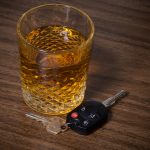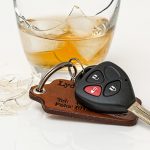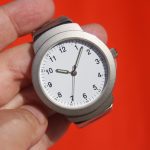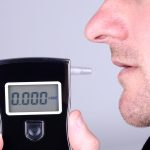The Offence of Mid-Range Drink Driving in New South Wales
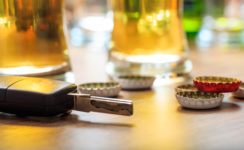
New South Wales Waratahs and Australian Wallabies hooker Tolu Latu has been fined and disqualified from driving after pleading guilty in Downing Centre Local Court to driving with a middle range prescribed concentration of alcohol and driving whilst suspended.
According to police papers, the 26-year old was detected asleep behind the wheel of his moving vehicle on Anzac Parade at around 4.30am on Thursday, 16 May 2019. Members of the public are said to have entered the car and applied the brake to prevent the vehicle from rolling into an intersection.
Police were called and Mr Latu was subjected to a roadside breath test which gave a positive indication to alcohol. He was arrested and taken to the police station, where the breath analysis machine detected an alcohol reading of 0.135.
In court, the Magistrate handed the rugby star a $1,300 fine and imposed the minimum disqualification period of three months, followed by a 12 month period during which he must have an alcohol interlock device fitted to his vehicle. The device requires a driver to register a negative reading for alcohol in his or her breath before the car is able to start.
In addition to the court-imposed penalties, Rugby Australia has fined Mr Latu $5,000 and banned him for four games.
Rugby Australia’s Integrity Unit said in a statement:
“The financial penalty took into account that Latu has already accumulated out-of-pocket expenses totaling approximately $7,000 as a result of the court proceedings. Latu will also be required to participate in any counselling and/or alcohol education programs as deemed necessary by Rugby AU and/or the Waratahs for a period of 12 months.”
The Offence of Mid-Range Drink Driving in New South Wales
Driving with a middle range prescribed concentration of alcohol is an offence under section 110 of the Road Transport Act 2013 (NSW).
To establish the offence, the prosecution must prove beyond reasonable doubt that a driver had a concentration of at least 0.08 but less than 0.15 grams of alcohol in 100 millilitres of blood or 210 litres of breath at the time of driving.
The maximum penalties depend on whether it was the driver’s first, or second or more, ‘major traffic offence’ in the past five years.
Major traffic offences are defined by section 5 of the Act as including:
- Wounding, grievous bodily harm, manslaughter or murder caused by or arising from the use of a motor vehicle
- Furious driving
- Predatory driving
- Police pursuit (Skye’s law)
- Drink driving
- Drug driving (driving with an illicit substance present)
- Driving under the influence of drugs or alcohol (or ‘DUI’)
- Negligent driving occasioning death or grievous bodily harm
- Driving recklessly, furiously or in a manner or at a speed that is dangerous
- Menacing driving
- Failing to stop after an impact causing injury
- Refusing or failing to submit to a breath test, analysis or assessment
- Refusing or failing to provide oral fluid, urine or blood
- Wilfully introducing or altering alcohol or drugs in system, and
- aiding, abetting, counselling, procuring or being an accessory before the fact to any of the above.
If it is the driver’s first major traffic offence in the past five years, the maximum penalties for mid-range drink driving are:
- Up to 9 months in prison
- 6 month driver licence disqualification which can be reduced to 3 months, followed by
- 12 months during which you must have an interlock device installed to your vehicle, and
- Fine of $2,200
Alternatively, the court can ‘exempt’ a driver from the interlock requirement and impose maximum penalties of:
- Up to 9 months in prison
- 12 month licence disqualification which can be reduced to 6 months, and
- Fine of $2,200.
If it is the driver’s second or more major traffic offence in the past five years, the maximum penalties are:
- Up to 12 months in prison
- 9 month licence disqualification which can be reduced to 6 months, followed by
- 24 months during which you must have an interlock device installed to your vehicle, and
- Fine of $3,300
Alternatively, the court can exempt the driver from the interlock requirement and impose maximum penalties of:
- Up to12 months in prison
- 3 year licence disqualification which can be reduced to 12 months, and
- Fine of $3,300
Defending a Drink Driving Charge
Some of the most common ways to contest a drink driving charge are on the basis of:
Unsafe Reading
The most frequent defence to ‘drink driving’ is that a driver’s blood alcohol concentration may have been lower at the time of driving than later when analysed by police.
Studies make it clear that a person’s blood alcohol concentration rises for between 30 minutes and 1 hour after their last alcoholic drink.
This means, for example, that if someone has a few ‘quick drinks’ and gets ‘behind the wheel’ their blood alcohol concentration may be significantly lower when driving than 30 minutes or an hour later when tested on the ‘breath analysis’ machine.
Several factors can determine whether a driver’s reading when driving was likely to be lower than when tested.
These factors include:
- age, sex and weight,
- when and what food was consumed,
- number and type of alcoholic drinks,
- time of first and last drink,
- time of ‘roadside breath test’, and
- time of ‘breath analysis’.
At your first conference with Sydney Criminal Lawyers®, we will assess whether your blood alcohol concentration may have been lower at the time of driving than later when analysed.
If there is a possibility, we can obtain a ‘pharmacological report’ that can be used to:
- request withdrawal of the charge;
- request reduction of the charge-type, eg from ‘mid range PCA’ to ‘low range PCA’, and/or
- to defend the charge at a hearing.
The ‘Two-Hour’ Rule
Police are not permitted to breath test a person more than 2 hours after the person last drove.
If they do so, the evidence can be excluded by the court.
If it appears that police may have broken this rule, Sydney Criminal Lawyers® will notify them and request that they withdraw the charge.
If they nevertheless proceed with the case, we will fight to have the evidence excluded and costs awarded in your favour.
The ‘Home Safely’ Rule
Similarly, it is illegal for police to require a person to undergo a breath test on his or her own property.
If they do so, the evidence is liable to exclusion by the court.
Honest and Reasonable Mistake
This defence is available to persons who ‘honestly and reasonably’ believed they were under the limit when driving.
It is often easy to prove that a person’s mistake was ‘honest’.
However, it is becoming more and more difficult to prove that it was ‘reasonable’.
This is because there is so much advertising about not ‘drinking and driving’ at all.
However, there are a range of circumstances where the defence is available, including where a person’s drink was ‘spiked’ and they believed they were fatigued rather than affected by alcohol, and limited situations where a significant amount of time has elapsed since the last drink, such as where a person drove ‘the afternoon after’ drinking.
Going to court for a traffic offence?
If you are going to court for a traffic offence, call or email Sydney Criminal Lawyers anytime to arrange a free first consultation with an experienced, specialist traffic lawyer who will accurately advise you of your options, the best way forward, and fight for the optimal outcome in your specific situation.

